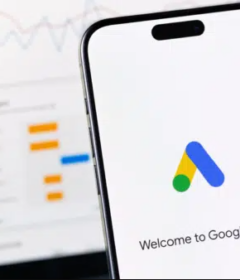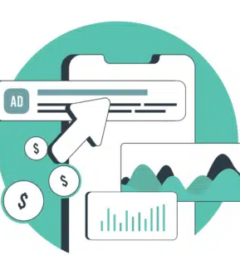Google tackles pollution and competitors with Maps updates; Thursday’s daily brief

Plus, the hallmarks of bad content marketing.
Good morning, Marketers, are the services you use environmentally sustainable?
I associate a lot of guilt with the amount of trash and recycling my household generates weekly. But, waste doesn’t just come from packaged goods, it can also come from the tech we use and the platforms we subscribe to.
Yesterday, Google announced that eco-friendly driving directions that prioritize the most fuel-efficient route over the fastest route are now live in Maps. Additionally, bike and scooter share information is now available in over 300 cities and lite navigation for cyclists is on the way. These are consumer-oriented updates meant to retain users or drive up adoption, which takes on more significance considering Google is the market leader — I’m skeptical these same features would attract many new users for one of the other search engines.
Naturally, Google isn’t the only search engine with environmental initiatives: Ecosia uses its profits for reforestation efforts. DuckDuckGo is already carbon negative. Microsoft has pledged to be carbon negative by 2030. And, Google has been carbon neutral since 2007 but plans to be carbon free by 2030.
While it’s objectively good to do what we can for the environment, this may diminish the unique selling point for services that differentiate themselves via their sustainability efforts, like Ecosia. Likewise, Google’s well-publicized privacy initiatives may make switching to DuckDuckGo seem less appealing. That’s the same thing we’re seeing in many search results pages, too: Why click on the result when the answer is already right there?
George Nguyen,
Editor
Google Analytics 4 updates include data-driven attribution, machine learning models to fill in measurement gaps and a Search Console integration
 100vw, 800px” data-lazy-src=”https://searchengineland.com/wp-content/seloads/2021/10/data_driven_attribution_google_analytics4-800×226.png” /><figcaption>Conversions by channel grouping using data-driven attribution. Image: Google.</figcaption></figure>
</div>
<p>A new Search Console integration, data-driven attribution and new machine learning models (conversion modeling and behavioral modeling) meant to fill in measurement gaps are coming to Google Analytics 4 (GA4).</p>
<p>Data-driven attribution without minimum thresholds will be available in attribution reports in the coming weeks. This update is a follow-up to Google’s announcement last week that it would be <a href=) moving away from last-click by making data-driven attribution the default model for all new Google Ads conversion actions. Additionally, Google says that conversion modeling can help marketers “identify where conversions have come from and allocate them to the right Google and non-Google channels, such as Search ads, email, or paid social” and that behavioral modeling may help you distinguish how many new users you acquired in your last campaign or which steps in your funnel have the highest user drop-off rates.
moving away from last-click by making data-driven attribution the default model for all new Google Ads conversion actions. Additionally, Google says that conversion modeling can help marketers “identify where conversions have come from and allocate them to the right Google and non-Google channels, such as Search ads, email, or paid social” and that behavioral modeling may help you distinguish how many new users you acquired in your last campaign or which steps in your funnel have the highest user drop-off rates.
The company has yet to announce if — or perhaps more accurately, when — it will deprecate Universal Analytics, but it’s been nearly a year since Google Analytics 4 was announced. The new features listed above and the language in the announcement (“With these additional capabilities, we encourage you to use the new Google Analytics as your primary web and app analytics solution going forward,”) show that the company is moving forward and away from Universal Analytics. Marketers should be setting up their GA4 properties now (if they haven’t already) so as to familiarize themselves with the platform and begin gathering as much data as possible. Many marketers have voiced frustration with the way GA4 is set up after so many years of using Universal Analytics. We hope that Google includes some UX changes to make the transition easier for marketers who are struggling to adapt to the updated platform.
After Facebook outage, some agencies are seeing a 50% drop in conversions
During the six hours Facebook was down on Monday, ad delivery grinded to a halt. Things seem to be heading back to normal but some advertisers are experiencing side effects: “There is a tracker and that tracker is not working,” Jason Sutla, SVP, head of media activation EMEA at Essence told Adweek — his agency is seeing a drop in conversions of at least 50% compared to normal levels for about half a dozen clients.
And, as the platform recovered from the outage, it seems to have sped up delivery, even mentioning in a blog post that some advertisers may see accelerated delivery. “But spending too much too quickly could lead to waste trying to chase short-term goals, especially for direct response campaigns,” wrote Lucinda Southern, “Low ad delivery and low conversions will have a knock-on effect on marketing spend returns.” Instead, advertisers should consider spreading that extra day of budget over a longer period.
Whenever a platform we rely on goes down, the conversation always turns to diversification — this is especially true when the platform is constantly under regulatory pressure and navigating PR nightmares. In addition, some Facebook advertisers may be experiencing diminished performance since Apple’s App Tracking Transparency rolled out. It may be worthwhile to evaluate whether other platforms, like Twitter, Snap or TikTok, should be a bigger part of your strategy.
Marketing humor to make you smile/facepalm
The metrics are made up, but the Marketoonist’s message is real. “Frequently in digital marketing, the referee and player are the same person,” said Marketoonist creator Tom Fishburne, “Marketing visibility can be simultaneously clear and opaque. To paraphrase Coleridge, the state of marketing is ‘metrics, metrics everywhere, and not sure what to think.’” Both agency and in-house can appreciate MarTech Editor Chris Wood’s advice here: “KPIs and higher company goals come first. Work back from those to determine which metrics will ‘move the needle’ and yield the results your team has targeted.”
One-star reviews, but as a podcast. Here’s one for the local SEOs among us: Beach Too Sandy, Water Too Wet is a comedy podcast featuring dramatic readings of “reviews written by real people with not-so-real problems.” Interestingly, it has 4.9 stars (3.6K ratings on Apple Podcasts).
“Wow they move fast.” This is the only Facebook outage-related joke I’m going to feature, but it’s a good one, especially if, like me, you have also gone last-minute costume shopping at a Spirit Halloween that didn’t exist just a few weeks prior.
What We’re Reading: The hallmarks of bad content marketing
Low-quality content marketing is often salesy and feels like a piece of marketing collateral — you simply know it when you see it and it can be a turn off for potential customers. In his post, Ryan Law, VP of content at Animalz, analyzed “The Four Forces of Bad Content” and provided strategies that brands and writers can adopt to make their content more honest, subtle and less salesy.
Unexpected self-promotion: Blindsiding a reader with an unnatural segue or barraging them with CTAs can make it all too clear that your priority is the conversion. Instead, Law suggests writing about the problems your product solves, not the product itself, and setting expectations from the get-go (like mentioning your product in the title).
Overly descriptive writing: This is the type of writing that is technically accurate but doesn’t tell the reader anything. “There’s only one way to replace the tell-tale signs of descriptive content: research,” Law said, emphasizing that more familiarity with the subject matter can cut down on verbose paragraphs and reader confusion.
Deference to data: Most marketers accept that campaigns should be data-driven, so why are data points so often used as a weak attempt to pique reader interest in the opening sentences or peppered in after the writing is done? “Research should not be a late-stage crutch to help defend a preconceived argument,” Law said, “It should be the process by which ideas are created in the first place.” Additionally, persuasive writing techniques can be used to deliver ideas while data should be used to support the argument, not be the argument.
Naivety: Content writers aren’t subject matter experts, which is why it’s easy to fall into bad habits like armchair criticism or making the obvious seem profound. While research and interviews will get you far, getting hands-on with the products you’re marketing can expand your knowledge and improve your content. Law also recommends using the first draft to consolidate relevant information and, with the second draft, synthesizing that information to form a cohesive narrative, defensible opinion or new idea.



